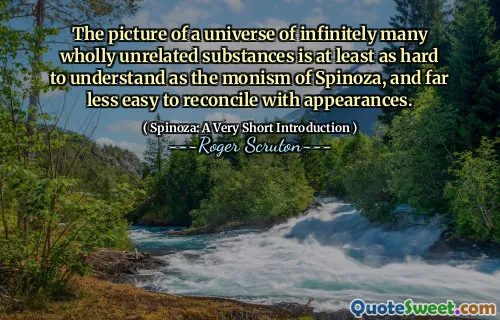The book "Spinoza: A Very Short Introduction" provides an accessible overview of the life and philosophy of Baruch Spinoza, a Dutch philosopher from the 17th century. It explores his significant contributions to modern philosophy, particularly his thoughts on ethics, metaphysics, and the nature of reality. The book emphasizes Spinoza’s unique perspective on God, nature, and human existence, showcasing how his ideas diverged from traditional religious beliefs of his time.
Additionally, the text delves into Spinoza’s philosophical method, highlighting his system of geometric reasoning and the connections between his ideas and later philosophical movements. His work is presented not only in the context of his own time but also in relation to contemporary philosophical discussions, making it relevant for modern readers. The author illustrates Spinoza’s lasting influence on subsequent thinkers and the relevance of his ideas in today's world.
Throughout the introduction, readers gain insight into Spinoza’s personal struggles and the controversies he faced due to his unorthodox views. By situating Spinoza within the broader intellectual landscape, the book invites readers to contemplate the profound implications of his thought on individual freedom, ethics, and the interconnectedness of all things. It serves as a concise yet rich resource for anyone interested in understanding Spinoza's philosophy and its significance today.
More »
Today Birthdays
1729 -
Edmund Burke
1949 -
Haruki Murakami
1954 -
Howard Stern
1876 -
Jack London
1993 -
Zayn Malik
1951 -
Kirstie Alley
1863 -
Swami Vivekananda
1923 -
Alice Miller
1987 -
Naya Rivera
1825 -
Brooke Foss Westcott
1944 -
Joe Frazier
1951 -
Rush Limbaugh
1964 -
Jeff Bezos
1978 -
Jeremy Camp
1628 -
Charles Perrault
1856 -
John Singer Sargent
1970 -
Kaja Foglio
1953 -
Rick Santelli
1986 -
Gemma Arterton
1968 -
Raf Simons
1958 -
Christiane Amanpour
1966 -
Olivier Martinez
1996 -
Ella Henderson
1917 -
Maharishi Mahesh Yogi
1949 -
Ottmar Hitzfeld
1928 -
Ruth Brown
1968 -
Heather Mills
1946 -
George Duke
1968 -
Rachael Harris
1923 -
Ira Hayes
